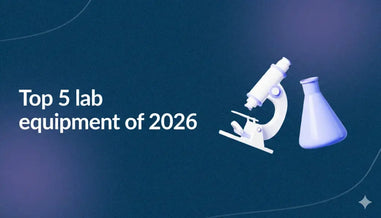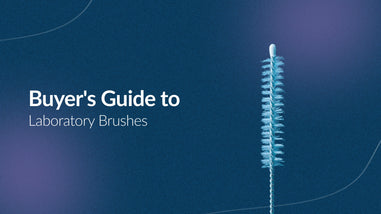- No products in the cart.
What is a pipette?
A pipette is a common laboratory tool used to transfer and dispense fixed amounts of liquids. Pipettes come in many different varieties, and each variety entails specific intended uses, builds, and requirements for use. Two of the most common types of pipettes are volumetric and graduated pipettes - both of which can be found in most laboratories and research facilities. However, there are significant qualities that differentiate them, and each type of pipette is built with distinct advantages and disadvantages - making it essential to understand the functions of each one before use.
Both tools are intended to be used to transfer small, measurable amounts of a liquid solution. However, there are differences in accuracy, demarcation styles, and volume capacity. Graduated pipettes can generally allow for different measurements of liquid to be transferred from one place to another. A volumetric pipette allows for only a specific (or fixed) amount of solution to be transferred.

Volumetric Pipettes
Volumetric pipettes (also known as bulb or belly pipettes) are slender pipettes calibrated for extreme accuracy. These pipettes are typically used by individuals analyzing reactions or studying chemical or biological properties. They are best used for acute measurements as they can be calibrated to deliver a precisely fixed volume of liquid with an accuracy of up to 4 significant figures.
The main advantage of a volumetric pipette is its accuracy. It is especially precise when it is delivering solutions, as another advantage of the standard build is its narrow neck. This allows for the meniscus to be read more accurately, and therefore deliver more precise results than graduated pipettes.
Standard volumetric pipettes can come in different fixed measurements, from 1 ml, 10 ml, 25 ml, and up to 50 ml options. There are also variable volume pipettes, which are volumetric pipettes that have an adjustment system that reduces the time and trivialities associated with selecting precise volumes. These use a click-stop digital system, come in a variety of size ranges, and are easy to calibrate and maintain.
So far, volumetric pipettes have the following:
Pros:
- Extremely accurate
- Easy to read (reduce risk of human error)
- Come in a variety of fixed sizes
- Variable volume pipettes increase both accuracy and ease of use
Cons and limitations:
- Can be more costly
- Measurements are fixed and are specific to the individual volumetric pipette. For a range of lab procedures that require a variety of volume sizes, a user would need a range of separate volumetric pipettes.
Graduate Pipettes
Graduated pipettes refer to pipettes with labeled volume increments alongside the tube. These pipettes come in many different forms and are often used for simple solution transfers. They are commonly made out of glass or durable plastic and have a tapered tip. Different types of graduated pipettes can be differentiated by build, and are classified under Type 1, Type 2, and Type 3. Type 1 pipettes have partially deliverable solutions for all volumes, Type 2 pipettes have the nominal value at the top of the pipette and zero at the bottom, and Type 3 pipettes deliver the solution completely but only at the nominal value. They are also classified by accuracy, Class A, Class AS, and Class B. Classes A and AS have specified error limits, while Class B pipettes can be less accurate, as they allow twice the error limits as the two prior.
Two major types of graduated pipettes are Mohr pipettes and serological pipettes. Both types have bi-directional graduations and are made to deliver volumes with varying accuracy. Serological pipettes such as these also have color-coded stripes for simple identification.
The difference between these two types of pipettes is that the volume of liquid that is ultimately transferred is different from the volumes indicated on the pipette before and after delivery. Calibration markings on Mohr pipettes begin above the tip, where serological pipettes are calibrated to the end of the tip.
Another popular variety of graduated pipettes are small graduated transfer pipettes. These are ideal for one-time-use, simple liquid transfers. The one-piece plastic pipettes made out of polyethylene are unbreakable and sterile; making them the best choice for working with tissue culture application, microbiology, or hematology. Small pipettes such as these also come in different sizes for different needs, and allow for precise drops and reproducible spotting.
In summary, graduated pipettes have the following:
Pros:
- Variety
- Type 1, Type, Type 3
- Class A, Class AS, Class B
- Clear labels alongside the tube
- Can be used for large amounts where accuracy is less critical
- Generally cost-efficient
Cons and limitations:
- Not as precise as volumetric pipettes when delivering and measuring liquid
- Accuracy varies among class and type
- Volume delivery varies among type
- A wider margin of human-use error
Both volumetric pipettes and graduated pipettes have their place in any lab, university, or research facility. The pros and cons related to each system of measurement are unique, and dependent on the build, make, and type of pipette and what their intended use is. Volumetric pipettes are the clear choice when working with chemical analysis, research, or anything requiring high accuracy. Graduated pipettes offer a range of different sizes, and provide durable and reliable measurement systems when working with different volume sizes. When choosing which types of laboratory tools are right for your lab, it is important to consider the requirements for your specific application.
For over 40 years, Lab Pro Inc. has been committed to delivering the highest quality laboratory equipment such as Volumetric Pipettes, graduated Pipettes, chemicals, lab supplies, and cleanroom PPE apparel to medical device and electronic manufacturing laboratories worldwide. To learn more, visit the biggest Lab Supply showroom in California, or contact us online or at 888-452-2776.












































